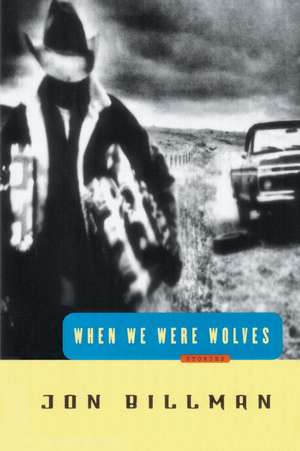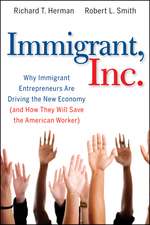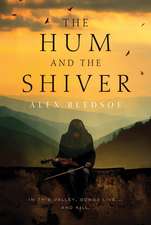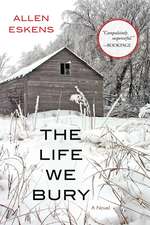When We Were Wolves: An Incurable Love Story
Autor Jon Billmanen Limba Engleză Paperback – 30 iun 1999
From a new talent that Annie Proulx has called an "important emerging writer" comes a surprising and expansive collection of stories, steeped in the lore of the frontier but unmistakably fresh and of our time.
When We Were Wolves roams over a West we never knew existed--colonized by rogues and tricksters, Custer impersonators, firefighters with a weakness for arson, and the other rootless folk who come to rest under the vast and forgiving desert sky. Jon Billman writes about accidental lives: people who are trapped in unsuitable marriages, impossible situations, but who handle them with the odd grace of those who are determined to live by their own strange code. He mingles the skewed humor of David Sedaris with the loping, rough-edged appeal of Tom McGuane. This is a beguiling new entry on the map of American fiction.
From the Hardcover edition.
Preț: 113.68 lei
Nou
Puncte Express: 171
Preț estimativ în valută:
21.76€ • 23.62$ • 18.27£
21.76€ • 23.62$ • 18.27£
Carte disponibilă
Livrare economică 01-15 aprilie
Preluare comenzi: 021 569.72.76
Specificații
ISBN-13: 9780812992311
ISBN-10: 0812992318
Pagini: 256
Dimensiuni: 155 x 229 x 17 mm
Greutate: 0.39 kg
Editura: Random House
ISBN-10: 0812992318
Pagini: 256
Dimensiuni: 155 x 229 x 17 mm
Greutate: 0.39 kg
Editura: Random House
Notă biografică
Jon Billman has worked as a wildland firefighter and seventh-grade teacher, and is now at work on a novel. His stories have appeared in Esquire, The Paris Review, Zoetrope, and The Missouri Review, among other publications. He lives in Kemmerer, Wyoming.
From the Hardcover edition.
From the Hardcover edition.
Extras
Like all prolonged natural disasters, the Dakota dust bowl bred superstition. Real estate changed hands by the bushel. The government and railroad boosters had told dirt-poor eastern farmers that if they moved into the Great American Desert and plowed, the rains would come. But unlike the chinch bugs, rain had not followed the plow here. After the buffalo were gone, the cattle ate the buffalo grass down to nothing. Then came the barbed-wire fences that only wind and soil and grasshoppers could pass through. After a few good wet years the droughts came. Then more mice and rabbits and winds. Without asking, folks in the Dakotas got parts of Texas and Oklahoma, and Canada landed good Dakota bottomland for a whistle. Townships, counties, entire states began to hold collective days of prayer to try to coax God into ending the suffering. It was a form of spiritual cloud-seeding as well as a one-ring circus. Preachers wrung their hands, looked at their shoes, then at the sky. People's new hope was that beating the socks off an Indian ball team might change the medicine.
We spent most of the Depression as barnstormers, living like the hoboes who packed the boxcars thick as blackbirds and playing other Indian League reservation teams, civic all-stars, semi-pro teams, barnstorming colored squads, CCC teams, Rotarians, and prison teams for whatever beans, chickens, Grain Belt beer, and gasoline we could get.
We drove around the Dakotas with the windows open, our mouths shut against the dirt that would settle on our teeth. Sometimes the dust would be so bad we had to keep wet handkerchiefs over our faces to breathe. When we were playing well and did have the money, we weren't allowed in most hotels or motor lodges. We stayed in the colored motels, but those were rare in the plains. Usually we stopped the car and slept with fleas and chiggers on wool blankets under the stars. Never rained anyway.
Our pitcher, Job Looks Twice, could tell the weather in his sleeve. "Hot today," he'd say in the relative cool of the morning when we set out in the old Model T for another town. Waves of heat would rise from the hood of the car. Dust rolled in the open windows and stuck to our faces. "Very hot." It was in the last of the wet years that Job, drunk as nine Indians, had fallen asleep on the tracks in downtown Sioux City, giving his right arm to a loaded eastbound grain train.
They could not reattach his arm because they never found it. For a time, just after the accident, Job cursed God and prayed that he might die. But the stump healed without infection, and unlike the rest of the country, Job's personal depression was short-lived. He cropped his hair, bought a new black traveling suit and straw fedora, and--good thing he pitched from the port side--went on to keep us well above 500. This in 1931, when it wouldn't rain any real amount on the plains for another ten years. Ever since the accident, Job could forecast the weather in his sleeve, from some feeling, or nonfeeling, where his arm used to be. We knew it wouldn't rain, for Job's barometric arm told us so. Dust was a part of our lives.
Job was a second-generation product of the missionaries and, after the accident, became obsessed with repentance. The loss of the limb had thrown the big lefty off-balance just enough to make his curve ball dance and his slider tail slick and hard. With the stump, which began just above where his elbow had been before Sioux City, he cradled his left-handed, three-fingered glove against his chest. He released the ball, followed through with his good arm, and capped the glove onto his good hand before the pitch reached the strike zone.
Job could field bunts as well as shots rifled at the mound, but he didn't need to have much range as a fielder: the other Indians--Asa Red Owl, Carp Whitehorse, Baptist Thundergrass, Walter and Jacob Elk, Jeremiah "Big Chief" Montgomery, Otis Downwind, and myself--covered the field like a trade blanket. At the plate Job learned to bunt one-handed and usually beat the throw to first.
In those days farmers and bankers would search the dawn sky for signs of rain, but the only clouds were clouds of dust, the only storms the soil-and-wind rollers that blew out of the south and west. "We cannot expect to understand the mysteries of God's weather," Job would say. He believed everything happened for a reason, God's reason. And unlike the rest of the team, Job never tried to question the logic behind it.
Besides his beloved spitball, Job was partial to another illegal gem he called his needleball. At any general store you could buy 78-rpm phonograph needles fifty for a dime. Job kept a few of the needles stuck in the seams of his trousers and a dozen or so more behind the mound under his rosin bag. With a motion that looked like he was simply wiping his only hand, he would unquiver a needle and finger it into the threads of the ball. The weight of the needle put rising zip onto his fastball and a ten-inch break in his nickel curve. Umpires would examine the ball but never find anything because the impact with the mitt or bat knocked the needle from the seams and into the dirt.
Before his accident Job's needleball had nearly killed a white man over to Woonsocket. The guy had used his spikes on Baptist Thundergrass at second base in the first inning, and Job had been brushing him back all afternoon with a salvo of knockdowns at the chest. Job would get the batter nervous and deep in the box, then paint the outside corner for strikes. A fastball in the eighth got away and he caught the batter in the temple. The man appeared dead, but as it turned out, Job only blinded him.
The Woonsocket players, too stunned to charge the mound, hovered around their downed comrade, fanning dust away from his nostrils. A minister climbed out of the stands and stood over the body, saying a prayer for his soul. Big Chief Montgomery walked out of a dirt devil in right field and started the car while the newly blind man held everyone's attention. The Indians lit out of town under cover of a dust storm. Blind man couldn't do more than snap beans for a living. Ever after the Indians steered clear of Woonsocket.
When Job lost his arm to the grain train he had thought it was retribution for the blinding. Arm for an eye. Job believed that if he lived a good life his de-railed arm would be waiting for him when he died.
"Sometimes," he said, "I'll reach for something with the arm that's not there. A tin cup. A baseball. I can feel the thing but can't pick it up. Then I'm aware that it will not be raining anytime soon." Job was sure weather came from heaven. "If my good outweighs the not-good and I make it there, I'll get my arm back. And the blind man from Woonsocket will get his eyes."
From the Hardcover edition.
We spent most of the Depression as barnstormers, living like the hoboes who packed the boxcars thick as blackbirds and playing other Indian League reservation teams, civic all-stars, semi-pro teams, barnstorming colored squads, CCC teams, Rotarians, and prison teams for whatever beans, chickens, Grain Belt beer, and gasoline we could get.
We drove around the Dakotas with the windows open, our mouths shut against the dirt that would settle on our teeth. Sometimes the dust would be so bad we had to keep wet handkerchiefs over our faces to breathe. When we were playing well and did have the money, we weren't allowed in most hotels or motor lodges. We stayed in the colored motels, but those were rare in the plains. Usually we stopped the car and slept with fleas and chiggers on wool blankets under the stars. Never rained anyway.
Our pitcher, Job Looks Twice, could tell the weather in his sleeve. "Hot today," he'd say in the relative cool of the morning when we set out in the old Model T for another town. Waves of heat would rise from the hood of the car. Dust rolled in the open windows and stuck to our faces. "Very hot." It was in the last of the wet years that Job, drunk as nine Indians, had fallen asleep on the tracks in downtown Sioux City, giving his right arm to a loaded eastbound grain train.
They could not reattach his arm because they never found it. For a time, just after the accident, Job cursed God and prayed that he might die. But the stump healed without infection, and unlike the rest of the country, Job's personal depression was short-lived. He cropped his hair, bought a new black traveling suit and straw fedora, and--good thing he pitched from the port side--went on to keep us well above 500. This in 1931, when it wouldn't rain any real amount on the plains for another ten years. Ever since the accident, Job could forecast the weather in his sleeve, from some feeling, or nonfeeling, where his arm used to be. We knew it wouldn't rain, for Job's barometric arm told us so. Dust was a part of our lives.
Job was a second-generation product of the missionaries and, after the accident, became obsessed with repentance. The loss of the limb had thrown the big lefty off-balance just enough to make his curve ball dance and his slider tail slick and hard. With the stump, which began just above where his elbow had been before Sioux City, he cradled his left-handed, three-fingered glove against his chest. He released the ball, followed through with his good arm, and capped the glove onto his good hand before the pitch reached the strike zone.
Job could field bunts as well as shots rifled at the mound, but he didn't need to have much range as a fielder: the other Indians--Asa Red Owl, Carp Whitehorse, Baptist Thundergrass, Walter and Jacob Elk, Jeremiah "Big Chief" Montgomery, Otis Downwind, and myself--covered the field like a trade blanket. At the plate Job learned to bunt one-handed and usually beat the throw to first.
In those days farmers and bankers would search the dawn sky for signs of rain, but the only clouds were clouds of dust, the only storms the soil-and-wind rollers that blew out of the south and west. "We cannot expect to understand the mysteries of God's weather," Job would say. He believed everything happened for a reason, God's reason. And unlike the rest of the team, Job never tried to question the logic behind it.
Besides his beloved spitball, Job was partial to another illegal gem he called his needleball. At any general store you could buy 78-rpm phonograph needles fifty for a dime. Job kept a few of the needles stuck in the seams of his trousers and a dozen or so more behind the mound under his rosin bag. With a motion that looked like he was simply wiping his only hand, he would unquiver a needle and finger it into the threads of the ball. The weight of the needle put rising zip onto his fastball and a ten-inch break in his nickel curve. Umpires would examine the ball but never find anything because the impact with the mitt or bat knocked the needle from the seams and into the dirt.
Before his accident Job's needleball had nearly killed a white man over to Woonsocket. The guy had used his spikes on Baptist Thundergrass at second base in the first inning, and Job had been brushing him back all afternoon with a salvo of knockdowns at the chest. Job would get the batter nervous and deep in the box, then paint the outside corner for strikes. A fastball in the eighth got away and he caught the batter in the temple. The man appeared dead, but as it turned out, Job only blinded him.
The Woonsocket players, too stunned to charge the mound, hovered around their downed comrade, fanning dust away from his nostrils. A minister climbed out of the stands and stood over the body, saying a prayer for his soul. Big Chief Montgomery walked out of a dirt devil in right field and started the car while the newly blind man held everyone's attention. The Indians lit out of town under cover of a dust storm. Blind man couldn't do more than snap beans for a living. Ever after the Indians steered clear of Woonsocket.
When Job lost his arm to the grain train he had thought it was retribution for the blinding. Arm for an eye. Job believed that if he lived a good life his de-railed arm would be waiting for him when he died.
"Sometimes," he said, "I'll reach for something with the arm that's not there. A tin cup. A baseball. I can feel the thing but can't pick it up. Then I'm aware that it will not be raining anytime soon." Job was sure weather came from heaven. "If my good outweighs the not-good and I make it there, I'll get my arm back. And the blind man from Woonsocket will get his eyes."
From the Hardcover edition.
Recenzii
"Jon Billman is a brilliant young writer with an astonishing range. These fresh and vivid stories are gritty, full of energy and humor, a sharp pleasure to read. Billman's feeling for rural backcountry, his knowledge of wildfire, baseball, bad weather and treacherous human hearts, mark him as an important emerging writer."--Annie Proulx
"I think it's the best collection of stories to come out of the American West in recent times. Jon Billman is very gifted--I look forward eagerly to what he does next."--Larry McMurtry
"An auspicious debut collection . . .this dream-breaking Wyoming proves
remarkably rich ground for Billman, who possesses an eye for the irony and
humor that sometimes flourish precisely because little else can."
--The New York Times Book Review
"The natural heir to flinty-eyed writers like McMurtry, Billman is lethally
witty and wonderfully perverse."
--OUTSIDE magazine
"An excellent debut collection . . . strikingly vivid. There are no sepia
tones here. The stories pulse with color, immediacy, and humor . . . even
when love fails, the characters enjoy a kind of exquisite loneliness, as
they extend the boundaries of an inner landscape."
--The Wall Street Journal
From the Hardcover edition.
"I think it's the best collection of stories to come out of the American West in recent times. Jon Billman is very gifted--I look forward eagerly to what he does next."--Larry McMurtry
"An auspicious debut collection . . .this dream-breaking Wyoming proves
remarkably rich ground for Billman, who possesses an eye for the irony and
humor that sometimes flourish precisely because little else can."
--The New York Times Book Review
"The natural heir to flinty-eyed writers like McMurtry, Billman is lethally
witty and wonderfully perverse."
--OUTSIDE magazine
"An excellent debut collection . . . strikingly vivid. There are no sepia
tones here. The stories pulse with color, immediacy, and humor . . . even
when love fails, the characters enjoy a kind of exquisite loneliness, as
they extend the boundaries of an inner landscape."
--The Wall Street Journal
From the Hardcover edition.

















